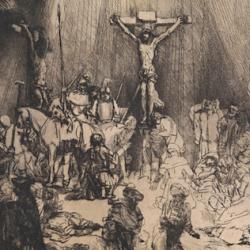Paul says that in the circumcision made without hands, the “body of the flesh” is stripped off by the “circumcision of Christ” (Colossians 2:11).
I take “circumcision of Christ” to to be a reference to Jesus’ death. He is the seed of Abraham according to flesh, and so He has to be “circumcised.” On the cross the flesh of Abraham is removed once and for all. On the cross, the Father condemned sin in the flesh.
But why a “body” of flesh?
Most commentators take this as a reference to Jesus’ physical body. That’s usually what it means in Paul, except when it refers to the corporate body of Christ. Does that make sense here? I think so: On the cross, Jesus stripped off the body of fleshly Israel, or what Jude calls the “body of Moses.” Jesus comes as the Davidic king, the embodiment of Israel in person, but on the cross, that body is stripped from the head. We can say that He dies as a Jew; but in dying as a Jew, He also dies to Judaism, to the flesh.
This fits with what Ephesians 2 says about the cross. On the cross, Jesus abolishes the enmity between Jew and Gentile, in order to make – in His resurrection – one new man of the two. When Jesus emerges from the grave, He’s no longer Jewish, but not Gentile either; that’s a fleshly distinction. He is the One New Man in one person, the head of the One New Humanity in which there is neither Jew nor Gentile.










